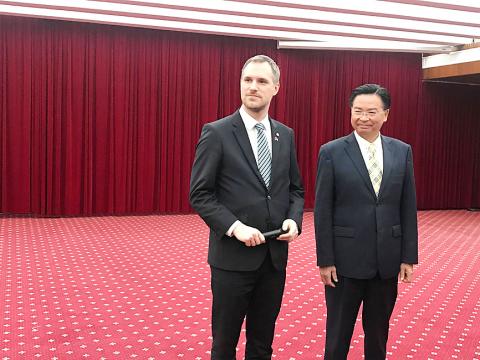Visiting Prague Mayor Zdenek Hrib yesterday criticized the expulsion, at China’s request, of a Taiwanese diplomat from a meeting held by the Czech Republic’s Ministry of Industry on Wednesday.
“From [the perspective of] simple human decency, it is unacceptable for me to throw [out] guests that I had invited as a host,” Hrib told a news conference at the Ministry of Foreign Affairs.
Czech news outlet HlidaciPes.org reported that Representative to the Czech Republic Wang Chung-yi (汪忠一) was asked to leave the meeting after Chinese Ambassador to the Czech Republic Zhang Jianmin (張建敏) demanded it.

Photo: Peng Wan-hsin, Taipei Times
Zhang said it was in the interest of the Czech Republic and Czech President Milos Zeman’s visit to China next month, HlidaciPes.org reported.
Hrib, who assumed office in November last year, said that he had faced a similar request from China when he held a customary meeting with foreign diplomats based in Prague, but he refused to comply.
He reiterated his opposition to the inclusion of a “one China” clause in the sister city agreement signed by Prague and Beijing in 2016, saying that his predecessors made a mistake by letting Beijing drag them into such a complicated matter.
“From my perspective, I would like the Prague city to have mutually beneficial relationships with the cities all over the world, but those partnerships must be equally beneficial for both sides,” he said, adding that the clause only benefited one party.
The negotiations are ongoing, he added.
Turning to economic ties between Taiwan and the Czech Republic, Hrib said that Taiwanese investments have helped create job opportunities in his country, while many of China’s investment promises have not been fulfilled.
Most investments from China did not appear to be real investments, but rather acquisitions, Hrib said.
He also raised concerns about a scandal implicating Chinese oil firm CEFC China Energy Co, which has made huge investments in the Czech Republic.
“Basically, their primary representative just kind of disappeared and his direct subordinate was convicted in the US for bribing UN representatives,” Hrib said. “This is I think not the investments that I would personally welcome in the Czech Republic.”

A preclearance service to facilitate entry for people traveling to select airports in Japan would be available from Thursday next week to Feb. 25 at Taiwan Taoyuan International Airport, Taoyuan International Airport Corp (TIAC) said on Tuesday. The service was first made available to Taiwanese travelers throughout the winter vacation of 2024 and during the Lunar New Year holiday. In addition to flights to the Japanese cities of Hakodate, Asahikawa, Akita, Sendai, Niigata, Okayama, Takamatsu, Kumamoto and Kagoshima, the service would be available to travelers to Kobe and Oita. The service can be accessed by passengers of 15 flight routes operated by

GIVE AND TAKE: Blood demand continues to rise each year, while fewer young donors are available due to the nation’s falling birthrate, a doctor said Blood donors can redeem points earned from donations to obtain limited edition Formosan black bear travel mugs, the Kaohsiung Blood Center said yesterday, as it announced a goal of stocking 20,000 units of blood prior to the Lunar New Year. The last month of the lunar year is National Blood Donation Month, when local centers seek to stockpile blood for use during the Lunar New Year holiday. The blood demand in southern Taiwan — including Tainan and Kaohsiung, as well as Chiayi, Pingtung, Penghu and Taitung counties — is about 2,000 units per day, the center said. The donation campaign aims to boost

ENHANCING EFFICIENCY: The apron can accommodate 16 airplanes overnight at Taoyuan airport while work on the third runway continues, the transport minister said A new temporary overnight parking apron at Taiwan Taoyuan International Airport is to start operating on Friday next week to boost operational efficiency while the third runway is being constructed, the Ministry of Transportation and Communications said yesterday. The apron — one of the crucial projects in the construction of the third runway — can accommodate 16 aircraft overnight at the nation’s largest international airport, Minister of Transportation and Communications Chen Shih-kai (陳世凱) told reporters while inspecting the new facility yesterday morning. Aside from providing the airport operator with greater flexibility in aircraft parking during the third runway construction,

American climber Alex Honnold is to attempt a free climb of Taipei 101 today at 9am, with traffic closures around the skyscraper. To accommodate the climb attempt and filming, the Taipei Department of Transportation said traffic controls would be enforced around the Taipei 101 area. If weather conditions delay the climb, the restrictions would be pushed back to tomorrow. Traffic controls would be in place today from 7am to 11am around the Taipei 101 area, the department said. Songzhi Road would be fully closed in both directions between Songlian Road and Xinyi Road Sec 5, it said, adding that bidirectional traffic controls would